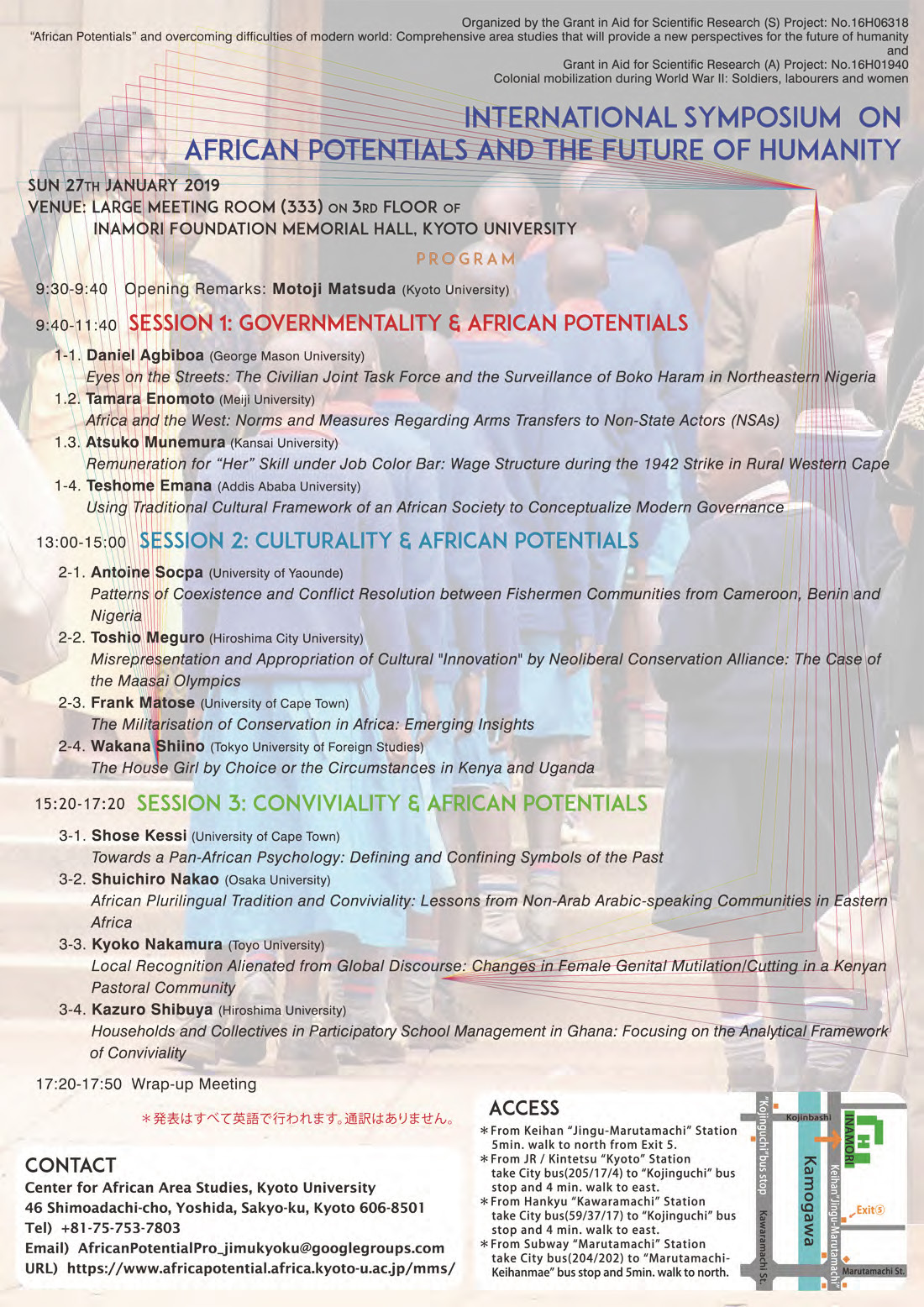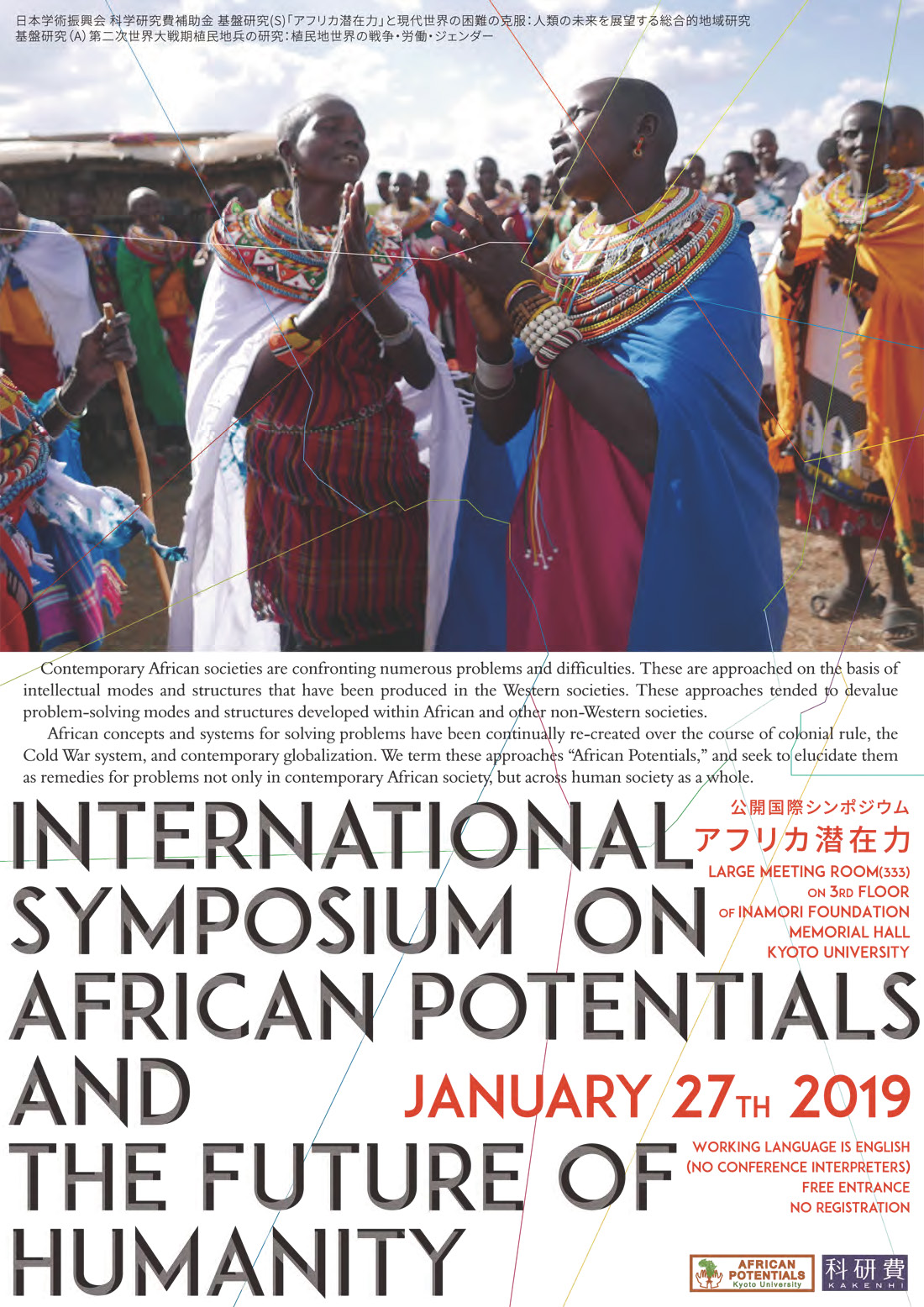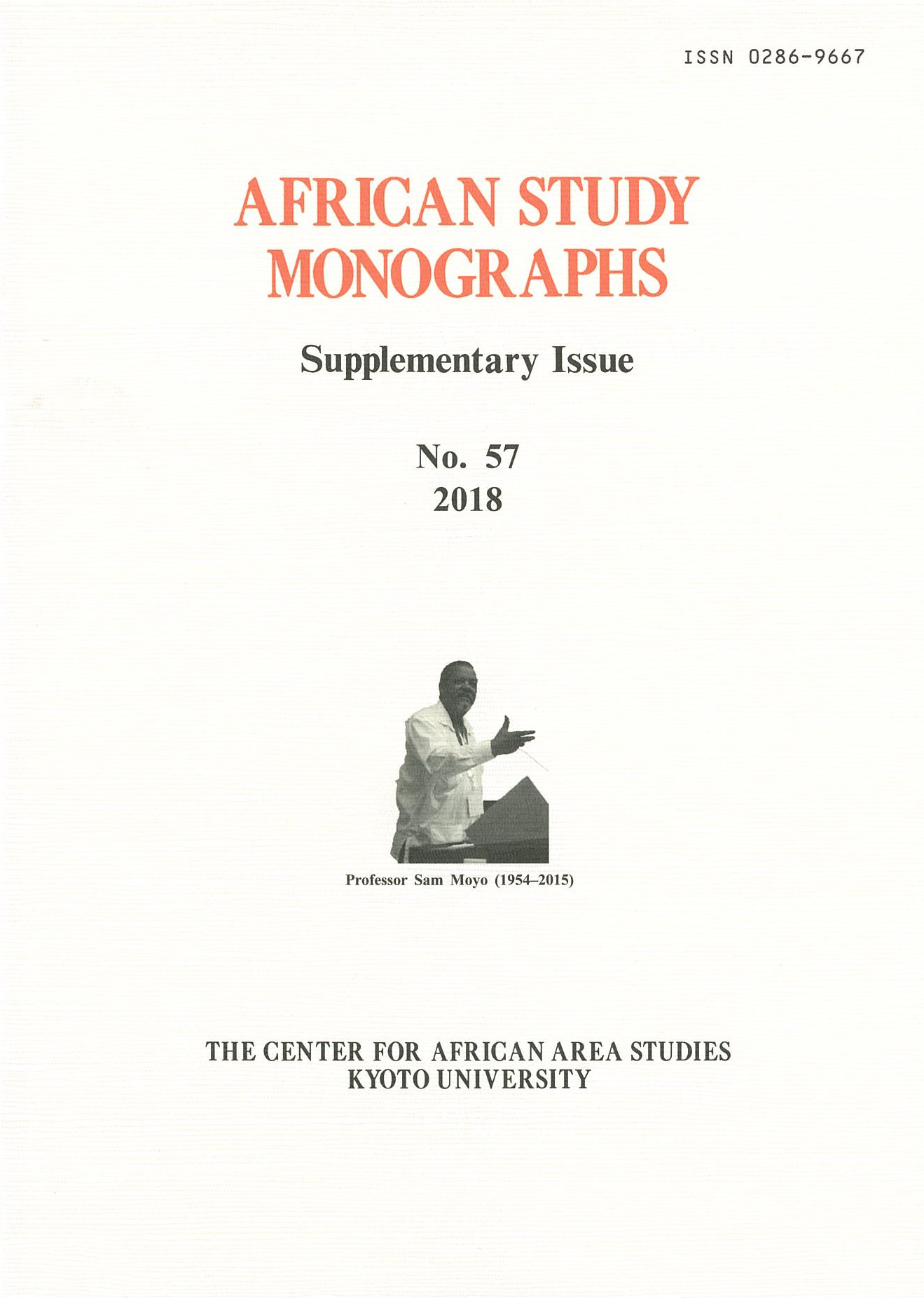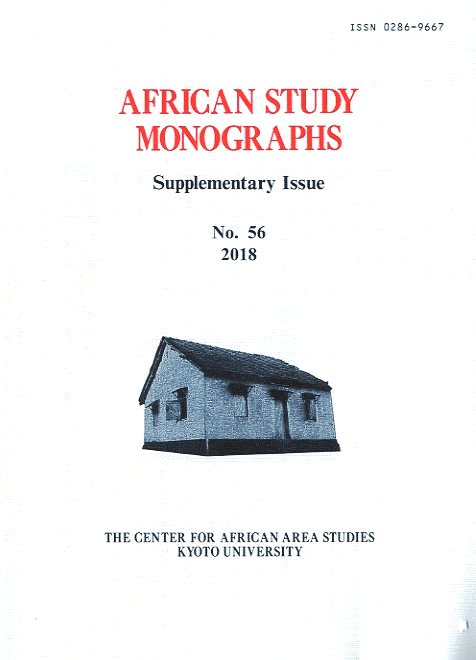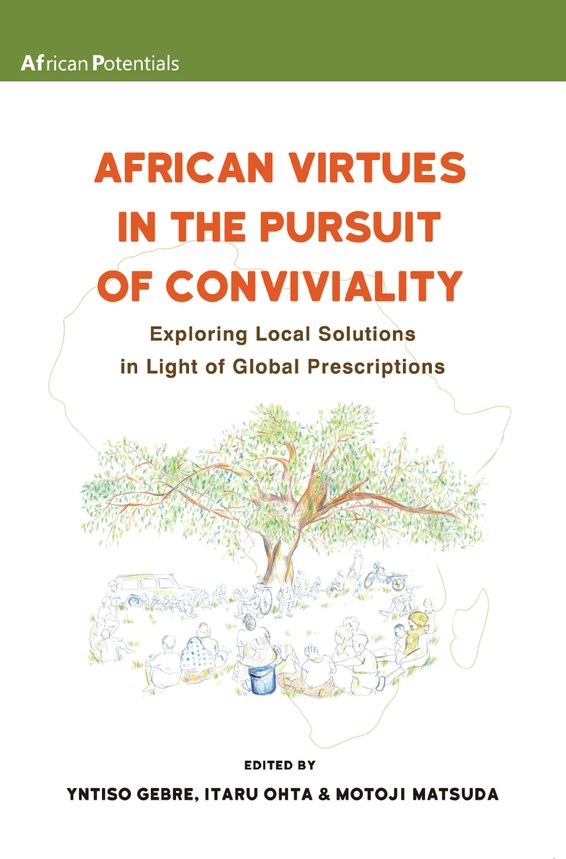[Research Team Meeting] 11th Meeting Gender and Sexuality Research Team (June 22, 2019)
Date: June 22, 2019
Venue: Room301 of Inamori Foundation Memorial Hall, Kyoto University
Discussion for publication of African Potentials book series
[WSSF2018] 4th World Social Science Forum 2018 (September 25-28, 2018)
Panel Title: New Universalities and African Potentials: Alternative Methods for Addressing Human Security Issues
Date: September 28, 2018
Venue: Fukuoka International Congress Center (Fukuoka city)
- Chair: Motoji Matsuda (Kyoto University, Japan)
- Speakers 1: Motoji Matsuda (Kyoto University, Japan)
Explanation of the Panel - Speaker 2: Michael Neocosmos (Rhodes University, South Africa)
Poli African Potentials for Universal Freedom, Democracy and Human Security - Speaker 3: Eisei Kurimoto (Osaka University, Japan)
Does International Humanitarianism Assume the Universal Humanity?: Undermining the African Potentials in South Sudan? - Speaker 4: Shoko Yamada (Nagoya University)
Being educated or being schooled? The potential of African traditional notion of ‘educated man’ in the era of sustainable development and globalization - Speaker 5: Rangarirai Gavin Muchetu (Doshisha University, Zimbabwe)
The power of peasant cooperatives in agricultural markets
[Research Team Meeting] 6th Meeting Nation and Citizenship Research Team / 6th Meeting Development and Livelihood Research Team (Jane 16, 2018)
Date: Jane 16, 2018 12:30~14:30
Venue: Small Room 2. 3rd floor of Inamori Foundation Memorial Hall, Kyoto University
Speaker: Toshihiro ABE (Otani University)
Title: Who can claim the right to benefit from rooibos industry?
[The 9th Plenary Meeting] Report from the Language and Literature Research Team (June 16, 2018)
Date and Time: June 16, 2018 (Saturday), 15:00 – 17:00
Venue: Main Meeting Room, 3rd Floor, Inamori Foundation Memorial Hall, Kyoto University
MC: Keiko Takemura (Osaka University)
At this plenary meeting, the Language and Literature Research Team delivered a report on its research activities. Since the African Potentials Research Project began its second phase in April 2016, the members of the team have discussed continuously the ways to utilize the concept of African Potentials and deepen their research within it. In this meeting, some of the research outcomes were shared in accordance with the following program, and the team deepened the discussion on African Potentials with the members of other research teams.
1. Progress Report on Activities by the Language and Literature Research Team — Keiko Takemura (Osaka University)
2. Dynamics of Arabic in Northeastern Africa: Convivial Multilingualism — Shuichiro Nakao (Osaka University)
3. Dialectic Development and Social Orientation of Literature in African Languages Seen in Formation of Yoruba Popular Music — Katsuhiko Shiota (Osaka University)
4. Comments: Sayaka Kutsukake (Osaka University), Satoshi Terao (University of Miyazaki)
5. General Discussion
In the beginning of the meeting, the team leader, Takemura, introduced the discussions of the Language and Literature Research Team regarding research centered on the concept of African Potentials. The team has conducted research on language expressions or language arts including music. Those who showcase creativity have often been seen as heretical or deviant by the others. In the course of the research, the team first suggested re-questioning the impact of such individuals on societies and discussed how dialectic understanding offers a useful viewpoint to grasp the relationship between the movement to maintain existing social norms and the artists who attempt to deviate from such movement, often to destroy traditional values. Second, the team discussed the importance of careful investigation of how expressionists deliver their messages and with what media in order for the team to proceed with the abovementioned research in practice.
Next, Nakao provided an overview on how this concept had been discussed and honed in the African Potentials Research Project. He marshaled the studies on the multilingual situation in Africa. Then, he introduced three case studies that he had carried out in fieldwork: the Juba Arabic language in South Sudan, as examples and discussed; the Nubi language, of which speakers spread across Kenya and Uganda; and the Benishangle Arabic language spoken in western Ethiopia. In considering these cases, he discussed the real state of the language use and the complex and dynamic identity of the speakers. In conclusion, he suggested a concept of “Convivial Multilingualism” as a form of representation of African Potentials with reference to Francis Nyamnjoh, an international collaborator for the African Potentials Research Project. He argued that this concept fundamentally criticizes European-born multilingualism/multiculturalism and may develop as a very strong concept to better understand Africa where people coinhabit with others while choosing different languages in accordance to the contexts.
Then, Shiota discussed how African language arts closely relate to awareness of issues and interests of the society, while analyzing the process of the formation of Yoruba music in Nigeria, which had incorporated external elements into indigenous elements in its process of evolution and sophistication. He analyzed the formation as a dialectic process with reference to discussions of Michael Neocosmos, an international collaborator of the African Potentials Research Project. First, Shiota outlined the Yoruba people and provided a historical overview of their music. Their significant music instrument, Dun Dun (talking drum), was developed as a part of court culture in the Oyo empire, then spread and popularized across the country in the course of the unification of the Yoruba as an ethnic group, and was sublimed as the music instrument representing the Yoruba. Moreover, in the 1960s, Nigerian popular music (e.g., Juju and Apala) evolved from the influence of Western music and Islamic ritual music and also incorporated Dun Dun and created new ensemble forms. Analyses of lyrics of Yoruba popular songs unveiled their close relation to community values, social morals and requirements/demands from society—in other words, many of them are socially oriented. Shiota discussed that in order to evaluate them, having a perspective, which is different from that of Western art, is important.
In the General Discussion, which included a comment session, the participants discussed the potency and possibility of concepts of Conviviality and Incompleteness, which had been raised by Francis Nyamnjoh (Nyamnjoh F., 2015. “Incompleteness: Frontier Africa and the Currency of Conviviality.” Journal of Asian and African Studies, 1–18. DOI: 10.1177/0021909615580867).
Reported by Itaru Ohta
[Research Team Meeting] 9th Meeting Language and Literature Research Team (May 17, 2019)
Date: May 17, 2019 13:0-17:00
Venue: Room 607, Osaka University Nakanoshima Center
Speaker1: Haruse Murata
Title:Bernard B. Dadié and the African Oral Literature
Speaker2: Fuko Onoda (Kyoto Univeristy)
Title: Reading Swahili Political Poetry as “Social-Oriented Art”: Focusing on A 19th Century Poet Muyaka bin Haji
Speaker3: Manami HAYASHI (Osaka Prefecture University)
Title: An Analysis of the Role Model that a Local NGO Proposed to Maasai Girls during the Alternative Rites of Passage of Female Genital Mutilation
[3rd Kyoto Symposium / 11th Plenary Committee Meeting] International Symposium on African Potentials and the Future of Humanity (January 27, 2019)
Date and Time: 9:30-17:50, January 27, 2019 (Sunday)
Venue: Large Meeting Room (333), 3rd Floor, Inamori Foundation Memorial Hall, Kyoto University
Facilitator: Gen YAMAKOSHI (Kyoto University)
9:30-9:40 Opening Remarks: Motoji Matsuda (Kyoto University)
9:40-11:40 Session 1: Governmentality & African Potentials
Chair: Shinichi TAKEUCHI (Tokyo University of Foreign Studies)
Discussant: Momoka MAKI (Sophia University)
- 1-1. Daniel AGBIBOA (George Mason University)
Eyes on the Streets: The Civilian Joint Task Force and the Surveillance of Boko Haram in Northeastern Nigeria - 1.2. Tamara ENOMOTO (Meiji University)
Africa and the West: Norms and Measures Regarding Arms Transfers to Non-State Actors (NSAs) - 1.3. Atsuko MUNEMURA (Kansai University)
Remuneration for “Her” Skill under Job Color Bar: Wage Structure during the 1942 Strike in Rural Western Cape - 1-4. Teshome EMANA (Addis Ababa University)
Using Traditional Cultural Framework of an African Society to Conceptualize Modern Governance
11:40-13:00 Lunch Break
13:00-15:00 Session 2: Culturality & African Potentials
Chair: Misa HIRANO-NOMOTO (Kyoto University)
Discussant: Nobuko NISHIZAKI (Fukushima University)
- 2-1. Antoine SOCPA (University of Yaounde)
Patterns of Coexistence and Conflict Resolution between Fishermen Communities from Cameroon, Benin and Nigeria - 2-2. Toshio MEGURO (Hiroshima City University)
Misrepresentation and Appropriation of Cultural “Innovation” by Neoliberal Conservation Alliance: The Case of the Maasai Olympics - 2-3. Frank MATOSE (University of Cape Town)
The Militarisation of Conservation in Africa: Emerging Insights - 2-4. Wakana SHIINO (Tokyo University of Foreign Studies)
The House Girl by Choice or the Circumstances in Kenya and Uganda
Program
15:00-15:20 Break
15:20-17:20 Session 3: Conviviality & African Potentials
Chair: Itaru OHTA (Kyoto University)
Discussant: Akira TAKADA (Kyoto University)
- 3-1. Shose KESSI (University of Cape Town)
Towards a Pan-African Psychology: Defining and Confining Symbols of the Past - 3-2. Shuichiro NAKAO (Osaka University)
African Plurilingual Tradition and Conviviality: Lessons from Non-Arab Arabic-speaking Communities in Eastern Africa - 3-3. Kyoko NAKAMURA (Toyo University)
Local Recognition Alienated from Global Discourse: Changes in Female Genital Mutilation/Cutting in a Kenyan Pastoral Community - 3-4. Kazuro SHIBUYA (Hiroshima University)
Households and Collectives in Participatory School Management in Ghana: Focusing on the Analytical Framework of Conviviality
17:20-17:50 Wrap-up Meeting
Facilitator: Eisei KURIMOTO (Osaka University)
Co-host: Studies on Colonial Soldiers during WWII: War, Labour and Gender in the Colonial World (16H01940)
[Research Team Meeting] 7th Meeting Education and Human Development Research Team (October 2, 2018)
Date: October 2, 2018 16:00~18:00
Venue: Meeting room 1, 8th floor, Graduate School of International Development, Nagoya University
Speaker: Crain Soudien (Human Sciences Research Council, South Africa)
Title: Decolonisation debate in South Africa and its wider significance for education
[Joint Team Meeting] 6th Meeting Education and Human Development Research Team / 7th Meeting Language and Literature Research Team (June 16, 2018)
Date: June 16, 2018 12:30-14:30
Venue: Middle-sized Meeting Room, 3rd floor of Inamori Foundation Memorial Building, Kyoto University
Speaker 1: Kazuro Shibuya (Hiroshima University)
Speaker 2: Asayo Ohba (Teikyo University)
Title: Book review and discussion: Ivan Illich (1973) “Tools for Conviviality”
[Research Team Meeting] 9th Meeting Environment and Ecology Research Team (January 26, 2019)
Date: January 26, 2019 13:00-15:00
Venue: Room 318, 3rd floor of Inamori Foundation Memorial Hall, Kyoto University
Speaker 1: Chihiro ITO (Hiroshima Jogakuin University)
Title: Indigenization of Commercial Fishing Industry and Its Challenge for Resource Management in Lake Kariba, Zimbabwe
Speaker 2: Yuichiro FUJIOKA (Kyusyu University)
Title: Commodification of Non-Timber Forest Products and Its “Potential”: The Case of Marula Products in South Africa
[Research Team Meeting] 8th Meeting Environment and Ecology Research Team (December 22, 2018)
Date: December 22, 2018 12:00-17:00
Venue: Room 318, 3rd floor of Inamori Foundation Memorial Hall, Kyoto University
Speaker 1: Ryoma OTSUKA (Kyoto University)
Title: Sustainability of Ecotourism and Community Conservation in Bwindi Impenetrable National Park, Uganda: Why Is It Difficult to Follow “Gorilla Rules”?
Speaker 2: Yuji TAKENOSHITA (Chubu Gakuin University)
Title: What Do They and I Really Want to Achieve with Gorillas? : Too Many “Stakeholders” Around Too Few Gorillas.
